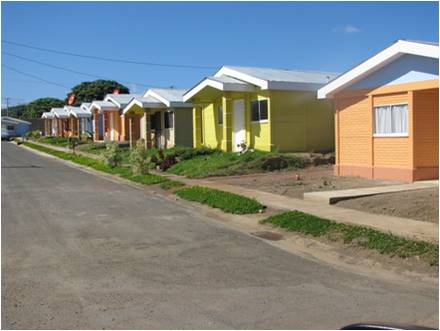- Australia and New Zealand
- East Asia and the Pacific
- Europe and Central Asia
- Albania
- Armenia
- Austria
- Azerbaijan
- Belarus
- Belgium
- Bosnia and Herzegovina
- Bulgaria
- Croatia
- Cyprus
- Czech Republic
- Denmark
- Estonia
- Finland
- France
- Georgia
- Germany
- Greece
- Hungary
- Iceland
- Ireland
- Italy
- Kazakhstan
- Kyrgyz Republic
- Latvia
- Liechtenstein
- Lithuania
- Luxembourg
- Malta
- Netherlands
- Norway
- Poland
- Portugal
- Romania
- Russian Federation
- Serbia
- Slovak Republic
- Slovenia
- Spain
- Sweden
- Switzerland
- Turkey
- Ukraine
- United Kingdom
- Uzbekistan
- Middle East and North Africa
- North America
- South Asia
- Sub-Saharan Africa
Home > Countries > Latin America and the CaribbeanNicaragua
Country Profile
 Source: Affordable Housing Institute - Vistas de Momotombo, 2012
Source: Affordable Housing Institute - Vistas de Momotombo, 2012
In 2011 Nicaragua had a population of 5.87 million people. Fifty-eight percent of Nicaraguans live in an urban environment. Over the past five years the annual growth of the urban population (2 percent) has outpaced that of the total population (1 percent) (WDI).
Property rights continue to be a major issue in Nicaragua. The combination of a major wave of expropriations in the 1980s and poor record keeping in property registries make establishing a title history difficult. In recent years the situation has worsened again as President Ortegas stated that the government would not evict anyone who illegally took private property in land invasions which has resulted in an increase of property invasions (US Department of State).
These land seizures and illegal construction projects have led to a large gap between the number of homes occupied by owners with deeds and the number occupied without official deeds. The latest census of 2005 gave the proportion of home-owners at 84 percent, while only 51 percent were owners with deeds (INIDE).
Nicaragua’s banking sector remained small after the Sandinistas nationalized banks in the 1970s. However, since the 1990s when the financial system began to be privatized Nicaragua’s banking system has grown tremendously. This growth was noticeable in the residential mortgage market as well; outstanding mortgages totaled only US$1.2 million in 1991 and by 2000 had reached US$57 million. The residential mortgage market has continued its rapid expansion over the past decade. Outstanding mortgage loans totaled US$330 million in 2011 (Central Bank of Nicaragua).
Private banks provide the majority of housing finance in Nicaragua, originating all mortgage loans. The government provides upfront subsidies to support housing loans for lower income families through FOSOVI (Social Housing Fund), but the actual loans are made by private lenders. These subsidies amount to only US$4 million.
Copyright © 2026. HOFINET. By using or accessing this website, you signify that you agree to the Terms of Use.
When using or citing any information displayed on this website or accompanying blog sites, you must provide a reference to HOFINET.